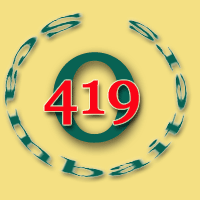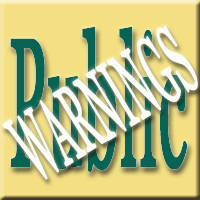
• Home •
Victim´s Story •
Fraud Prevention •
Project GSO •
Hall of Shame •
LINKS •

Consumer Protection - ESCROW FRAUD II
What is an Escrow Service?
An escrow service reduces the potential risk of fraud by acting as a trusted third party that collects, holds, and disburses funds according to buyer and seller instructions. Escrow service provides a secure way to buy or sell your vehicles. We urge you to use caution and common sense when dealing with all potential buyers or sellers.
Fraudsters sometimes create spoof escrow sites and encourage buyers to send money to them.
Remember these tips:
• Never EVER use any service recommended by the other party in your transaction, unless you have researched the company.
• TraderOnline.com will never tell you to use Western Union or Money Gram to pay for purchases.
• TraderOnline.com and Trader Publishing Company do NOT offer "Payment Protection Programs" services or "Verified Seller" services of any type.
• TraderOnline.com will never email you to certify that a "seller" is approved.
How does Escrow work?
Available to parties buying and selling vehicles in the United States, escrow.com protects both the buyer and the seller with a simple, 5-step trust process.
Step Trust Process for Escrow
1. Buyer and Seller Agree to Terms
Both parties agree to terms of the transaction, which includes a description of the vehicle, sale price, number of days for the Buyer's inspection of the vehicle, and any shipping information.
2. The Buyer Pays Escrow Service
The Buyer submits a payment, selecting check, money order, wire transfer, or credit card online. Escrow.com verifies the payment. Processing time varies by payment method.
3. The Seller Ships the Vehicle
Upon payment verification, the Seller is authorized to ship the vehicle and submit tracking information. Escrow.com verifies that the Buyer receives the vehicle.
4. Buyer Inspects and Accepts
The Buyer has a set number of days to inspect the vehicle and the option to accept or reject the vehicle. Upon acceptance, the process of transferring the title should begin.
5. The Seller is Paid by Escrow Service
The escrow service pays the Seller by check or wire transfer. The transaction is complete. For more information about pricing and other inquiries, please visit the escrow sites directly.
How much does Escrow.com cost?
Escrow.com has offered discounted fees (see table below) to BoatTraderOnline.com customers.
To obtain these special prices you will have to follow one of the links from BoatTraderOnline.com to Escrow.com
For Vehicle amount Escrow Fee:
up to $7,500 $100
$7,500 to $12,500 $115
$12,501 to $17,500 $130
$17,501 to $25,000 $150
$25,001 to $50,000 $175
$50,001 to $75,000 $200
$75,001 to $100,000 $300
$100,001 to $200,000 $500
$200,001 to $500,000 $1000
over $500,000 call
SELLER SCAMS
SELLER SCAMS = a fraudulent business scheme when the seller asks you to send a deposit or payment via Western Union or other wire transfer methods.
Although we strive to verify the identity of everyone who advertises on our site, fraudulent sellers may some times appear. Fraud sellers hope to lure you into doing business with them.
To av/h3>oid Seller scams, pay attention to the following clues:
• Seller asks you to send a deposit or payment via Western Union or other wire transfer methods.
• A price that is too low or too good to be true.
• A seller's phone number is out of service or rings to a fax machine.
• A seller's address is not verifiable.
• Beware of international sellers.
• A seller offers free shipping
• A seller doesn't want to discuss over the phone, but only wants to communicate by e-mail.
• A seller insists you use an escrow service you don't know.
• A seller is unwilling to show you proof of ownership (title, VIN number, registration)
• A seller who cannot provide you unique identification of the vehicle (non-ad photos, photos of actual VIN number on frame, etc.)
BUYER SCAMS
BUYER SCAMS = a fraudulent business scheme where a fraud buyer wants to send you an over payment cashier’s check just to have you send them back the difference.
Fraudsters sometimes pose as buyers interested in your vehicle for sale. They may try to pass you bad checks or overpay you and ask you to refund the difference. Here is the most important point:
*Most fraud buyers use counterfeit cashier’s checks and the bank has 30 days to verify the check.*
Do not assume that because the bank has cashed the check for you, it is a legitimate check. After the bank has paid you the money, the bank has 30 days to determine if the check is valid or not. The bank will come after you if they discover the check/money order is counterfeit. You will be expected to pay the funds back to the bank.
Examples of Buyers Scams
AUTO SCAMS
An auto scam occurs when someone sells a vehicle for a very low price. If the offer seems to good to be true, then is most likely is. Auto scams are most often a mixer of seller and buyer scams. These scams involve shipping a vehicle by a fraudulent shipping company or a claim stating that the vehicle is located in a warehouse. AutoTrader.com does not store vehicles in a warehouse for customers to purchase. We work diligently to review and identify fraudulent indicators on our vehicle advertisements, but it is important for the buyer and seller to always be wary. If you are trying to estimate the fair market value of your vehicle, then we recommend the following site: www.nadaguides.com
Beware of Scammers
The majority of responses to classified ads are genuine.
However, be aware of the potential for online scams. Classified ad scams frequently involve one or more of the following:
• an inquiry from someone far away, often in another country
• Western Union, Money Gram, cashier's check, money order, or a "guarantee"
• inability or refusal to meet face-to-face before finalizing the transaction
If you post a classified ad, you may receive fraudulent responses. While receipt of these responses is unavoidable, you can protect yourself by following a few simple, common-sense rules:
• DEAL LOCALLY with customers you meet in person
• DEAL only with cash
• NEVER agree to sell an item for more than the purchase price and refund the overpayment to the seller
• NEVER agree to purchase an item with partial payment
• NEVER agree to cash a check for a stranger
• NEVER WIRE FUNDS – most such requests are fraudulent
• NEVER send money, even if you receive a check. FAKE CASHIER CHECKS & MONEY ORDERS ARE COMMON, and BANKS WILL CASH THEM AND THEN HOLD YOU RESPONSIBLE when the fake is discovered up to 4 weeks later.
• NEVER, NEVER, NEVER GIVE OUT YOUR FINANCIAL INFORMATION (bank account number, social security number)
• DO NOT PARTICIPATE IN DEALS INVOLVING ESCROW SERVICES or A THIRD PARTY
• ONLY A SCAMMER WILL "GUARANTEE" YOUR TRANSACTION.
A few examples of online classified ad scams
Nigerian (or 419) Scam
The most visible form of advance fee fraud today is the Nigerian Letter or 419 fraud, named after the section of the Nigerian penal code that it violates. Originally sent by mail, and later by fax, the Nigerian Letter is now sent almost exclusively by e-mail. A typical letter includes a header that says something like “Confidential Business Proposal” and claims to come from a person needing to transfer large sums of money out of the country. As the Nigerian letter has become well known to potential targets, the gangs operating the scams have developed other variations. The targets are often told that they are the beneficiaries of an inheritance or are invited to impersonate the beneficiary of an unclaimed estate. The target may be told that a wealthy individual is being held hostage and will reward those who help to transfer the ransom money. Another common related scam is a fake lottery in which the targets are told that they have 'won' a large prize but must pay an 'administrative fee' before they can receive it. After the 'administrative fee' is paid, the scammer vanishes.
Dog for Sale Scam
This scam is relatively new, and is a hard to recognize as actually being a scam at first. In this scam, the scammer posts an online classified ad offering a rare or expensive dog for sale. The classified ad itself seems pretty normal, and there is nothing overtly suspicious about the way that it is written. But when you contact the seller, he will indicate that he would like you to send them a "shipping fee" or sometimes an "adoption fee" before they will sell the dog to you. Truth is there is no dog at all, and once the "seller" receives your deposit, he will disappear and be untraceable. While the scam is relatively simple, it sometimes works because the buyer is made to feel guilty about not paying "a small fee to ensure the animals health and safety.” Plus, who thinks that a nice dog breeder is going to try and scam them?
Note that not all "pets for sale" ads on this site or elsewhere on the Internet are scams. Just keep in mind that some may be, and exercise caution. If they want you to send money in advance, this should set off alarm bells
Banking Agent Scam
In this scam, the scammer posts an online classified ad which looks something like this:
"Growing international company is looking for a financial/art/sales agent in (your) area."
When you contact the author of this ad, he will inform you that he is part of a new overseas company which is just starting to break into the North American market. Because of "international banking regulations," he cannot accept payments from new North American customers. So he are looking for someone who will act as a "Banking Agent", and who will cash customers checks for them. If you deposit these checks into your own account, and then send them the majority of the funds, the company will give you a generous commission.
This scammer is getting you to deposit counterfeit checks in your own account, keeping some of the cash, and then sending the bulk of the funds off to him. You will probably be able to do this a few times before the bank catches up with you (it can take weeks for some banks to identify fraudulent checks). At that point, you are the one left holding the bag, and the person who sent the checks to you will have disappeared
Accidental Overpayment Scam
This scam is like the scam described above, with a slight twist. The scammer will contact you about your ad, indicating that he wants to purchase your item. When their check arrives in the mail, you notice that the amount on the check is much more than your purchase price.
Once you receive this check, being the nice person that you are, you will email the person telling him of his error. When the scammer responds to your email, he will probably suggest that you just deposit the check and send him back the overpaid amount. He may even offer you additional money for your honest response. Just like with the Banking Agent scam, after depositing the check you will find out that it was counterfeit.
© by GSO • Contact